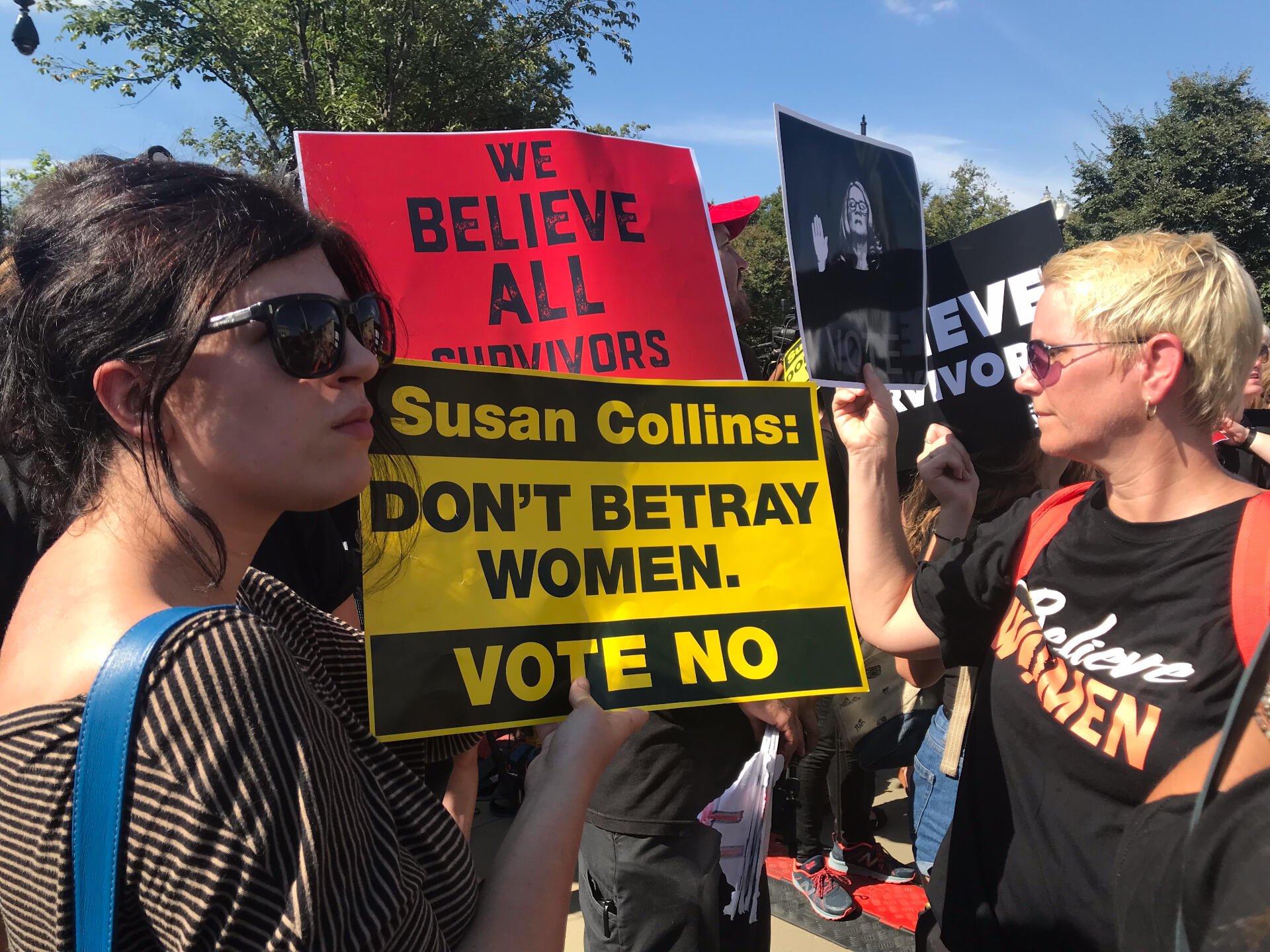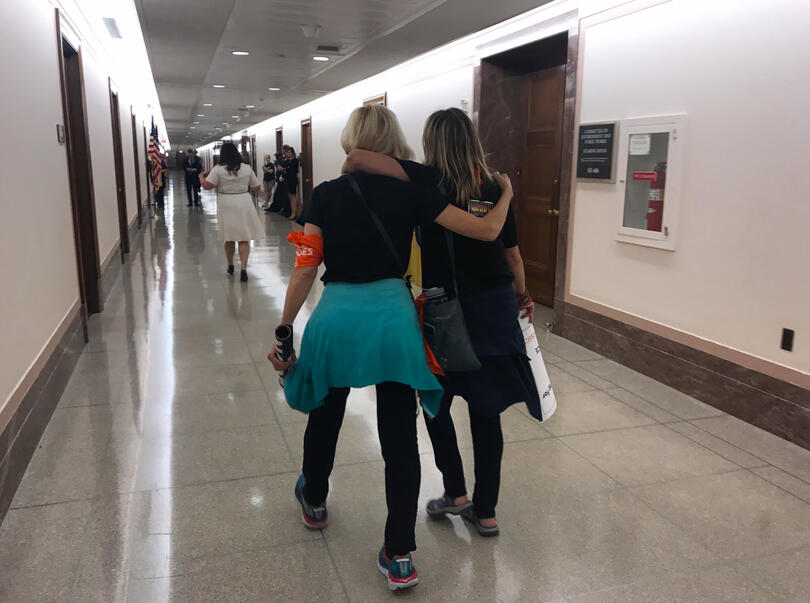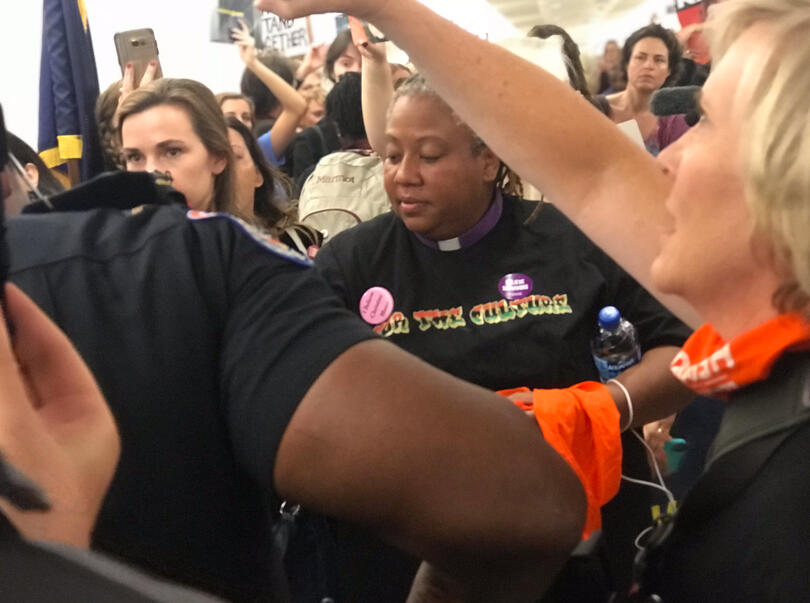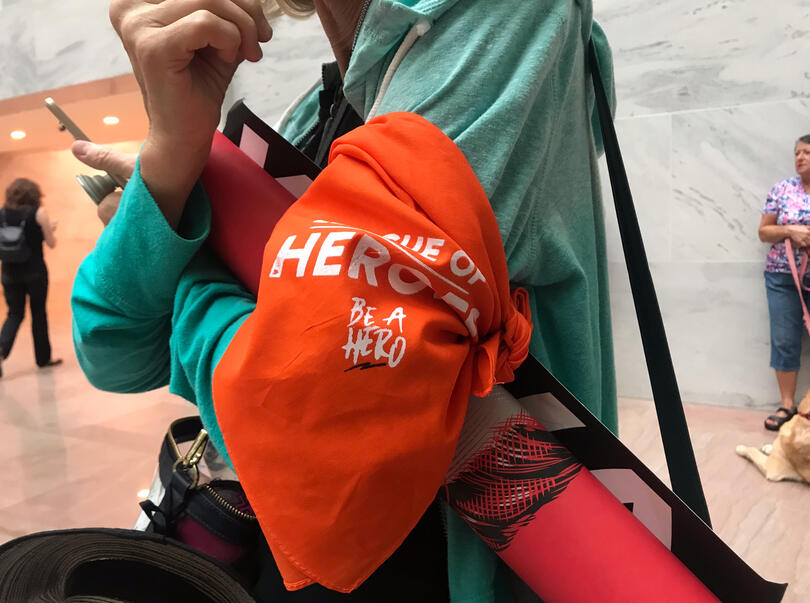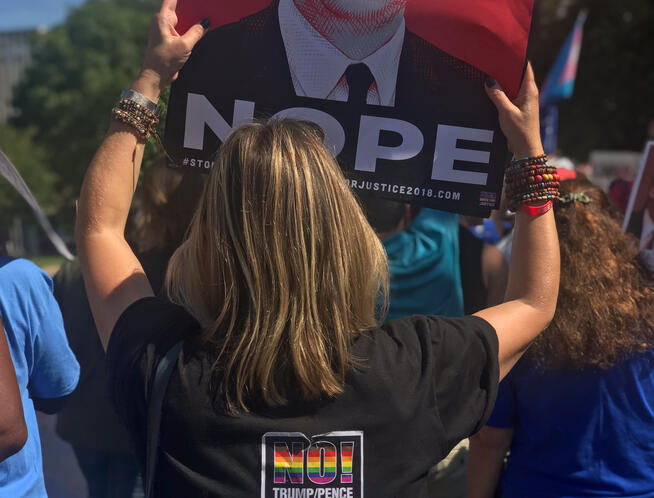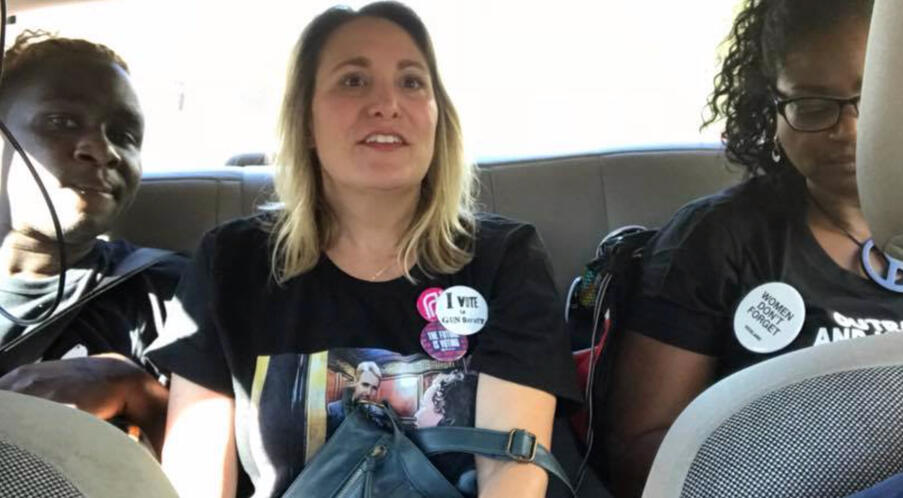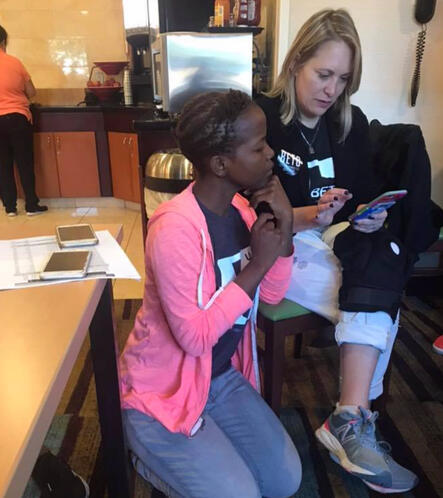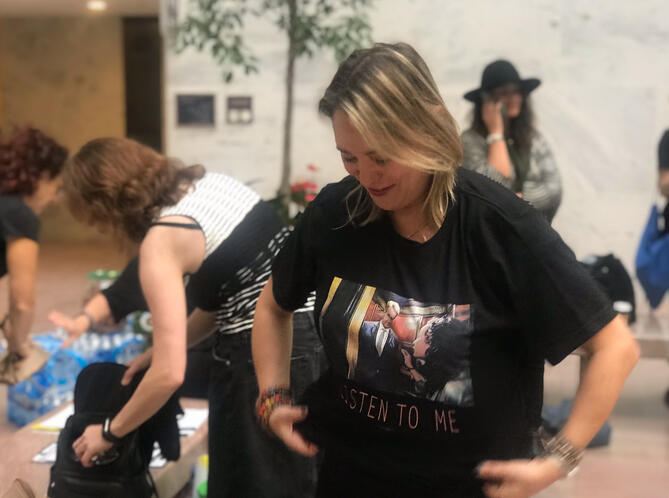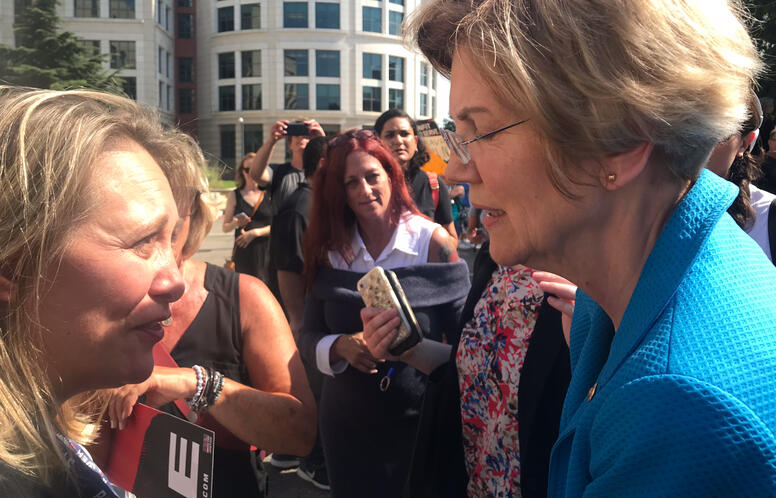For the first time,
they are done
being silent.
By Alexa Gagosz
White women, specifically those over the age of 40, are fueled by their own outrage of the Trump administration and are taking to activism-- canvassing for candidates outside of their own districts, catching buses to Washington D.C. for marches, fundraising and protesting in their local areas-- sometimes even getting arrested for it.
It was nearly midnight at South Station in Boston.
The station was nearly silent, quiet snores of awaiting passengers slept in waiting stations for buses to far-away cities. Traffic lights switched from red to green for cars that were no longer moving up and down Atlantic Avenue. She had her sleeping bag and a pillow hoisted over one shoulder with a duffle bag of a few days worth of clothes and hygiene materials that could be used in public restrooms and inside moving buses.
She scrolled through her email, waited for a response by the national Women’s March organization paying for her overnight trip to Washington D.C., and anxiously looked out the window for a 55-seat charter bus to arrive to pick up her and fellow activists from Massachusetts. In just nine hours, she would travel half-way down the east coast, leaving behind her job as a nurse practitioner, her three children, husband and home to protest against then Supreme Court nominee Judge Brett Kavanaugh.
Candice Sullivan, 45, of Dover Massachusetts was ready to fight against President Donald Trump’s pick for a lifelong appointment. But it would not be the only battle she would take part of in the weeks leading up to the 2018 Midterm elections.
As the daughter of two Trump supporters, Sullivan found herself at seemingly every political action venue, event and protest she could, and not just in Washington. She zigzagged throughout her home state of Massachusetts since Inauguration Day and then to Dallas to canvas for Beto O’Rourke the week before the Election Day of 2018.
“I just feel like I have to do something,” said Sullivan, who “never really” protested before the Trump administration other than a pro-choice rally in the 1990s.
White women in America: the swing vote
White suburban women like Sullivan were considered the swing vote for the midterm elections. The same demographic had propelled Trump into the Oval Office in 2016 as 53 percent of white women had voted for the Republican nominee. Young people are very much involved in the so-called resistance movement, but so too are a different brand of a new political activist, who are seemingly older, whiter and just as enraged. Many white women, specifically those over the age of 40, are fueled by their own outrage of the Trump administration and are taking to activism-- canvassing for candidates outside of their own districts, catching buses to Washington D.C. for marches, fundraising and protesting in their local areas-- sometimes even getting arrested for it. Their efforts were followed by Democrats taking back the U.S. House of Representatives as the party majority and they hope that same energy continues for the fight for the Oval Office in 2020.
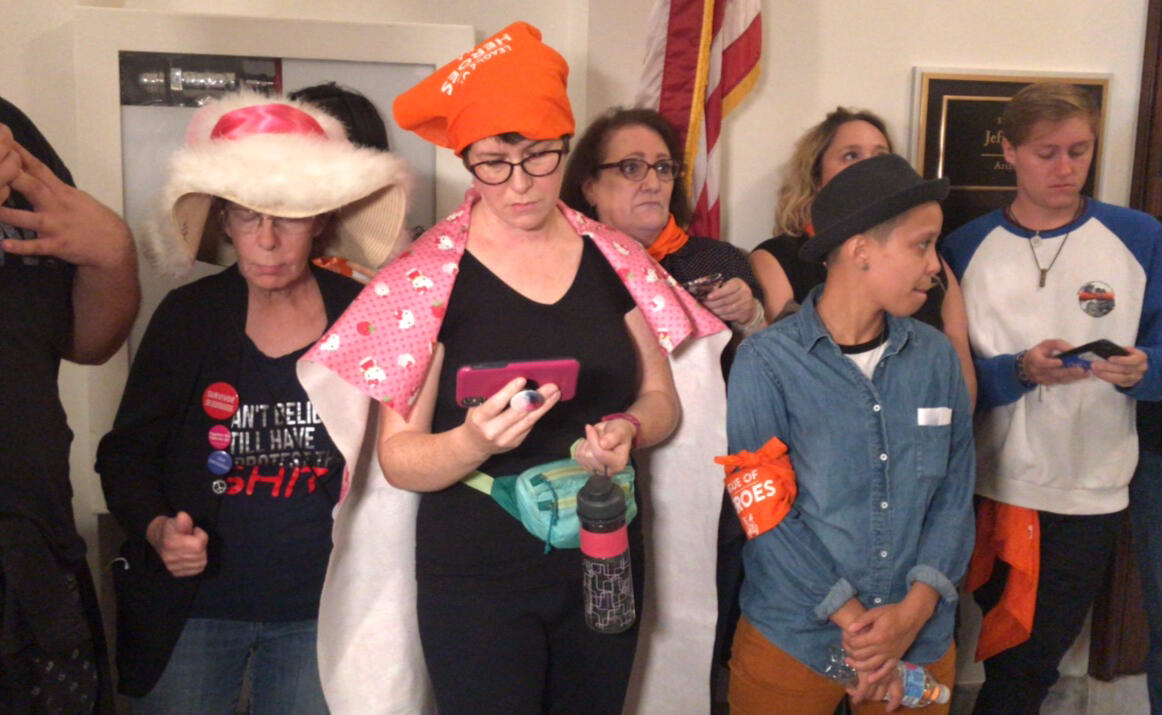
Many women activists have traveled across the country to rally against actions by the Trump administration since he was inaugurated in. Some of them have been arrested for their civil disobedience while in Washington D.C., but also in their home states and cities.
Voting Habits
White women voting demographics by age group
*Data collected by the United States Census Bureau: Voting and Registration in the Election of November 2016
voices
Click on the each woman to hear her story.
Women typically turn out in higher rates than men, on average, since the Presidential election of 1980 and Midterm election of 1986. White women are not always dependable for Democrats, but in 2018, polls showed that women leaned toward Democrats. Nearly 52 percent of early voters in key states for the Midterms were women. These states include Arizona, Florida, Nevada, Georgia, Texas, Tennessee and Montana. Early counts say that early voters in 22 states have outmatched 2014 early ballots as of Saturday night.
A record number of 309 women ran for House seats for the 2018 midterm season, where Democrats believed they could flip from a Republican majority.
Outside polling centers, these fired up women activists stood outside with signs and rallied for their progressive candidates, including Kay Alford Hughes, 75, of Hot Springs, Arkansas who lives in an area of the country where “Democrats are woefully outnumbered.”
“Nothing in my lifetime, including Civil Rights and Vietnam, has scared me as much as Donald Trump and this extremist legislature,” said Hughes.
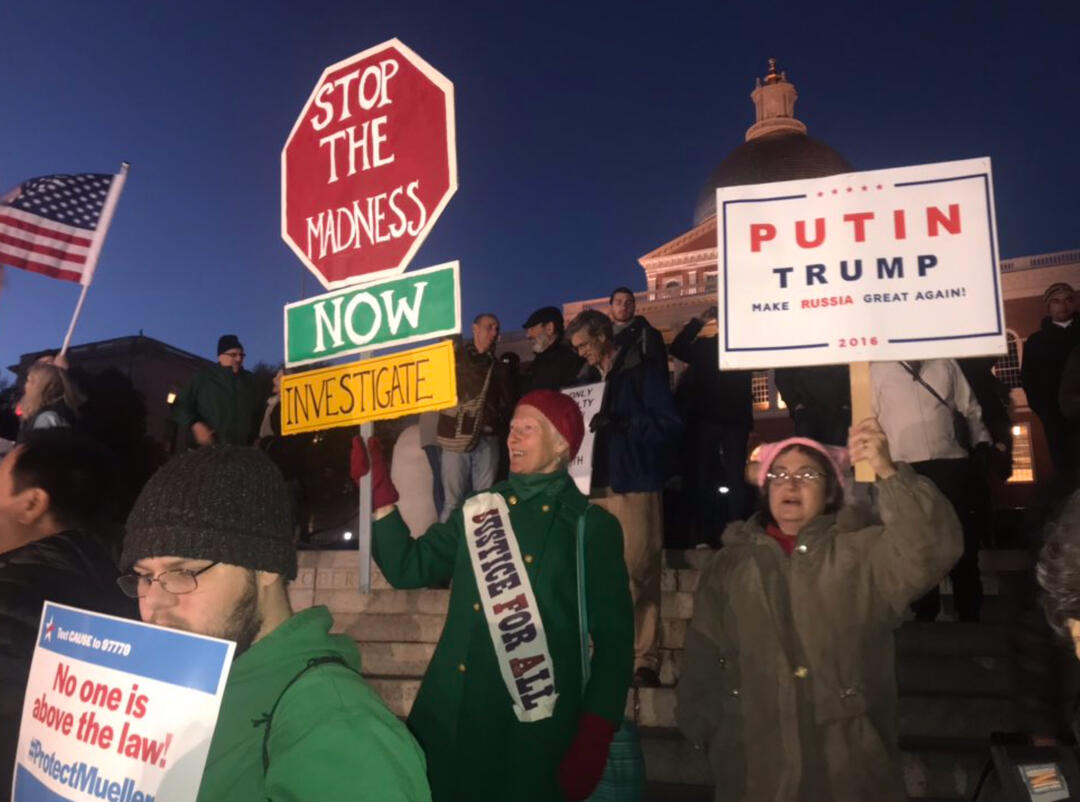
Protest on the Boston Common after former Attorney General Jeff Sessions had handed in a note of resignation to President Trump. Local Indivisible chapters across the United States had organized pop-up demonstration in cities, including Boston to call for the protection of Special Counsel Investigation on the Russian probe, led by Robert Mueller.
Most of the guest speakers at this rally were women.
Some politicians have taken note of the strong activism among white women as of late. Jay Gonzalez, who ran an unsuccessful campaign against popular Governor Charlie Baker (R-Massachusetts), said in an interview that the majority of his campaign managers across the state were women.
“One of the things that I am finding with women [white and over the age of 45] is they are really concerned about the direction of our nation,” said Gonzalez.
Gonzalez said this demographic of women has shown up to meetings, attended Democratic town committees and "wanted to do something" the most.
“I am encouraged by their level of Engagement," said Gonzalez.
Gonzalez lost to Baker by 33.8 percentage points, according to the Associated Press.
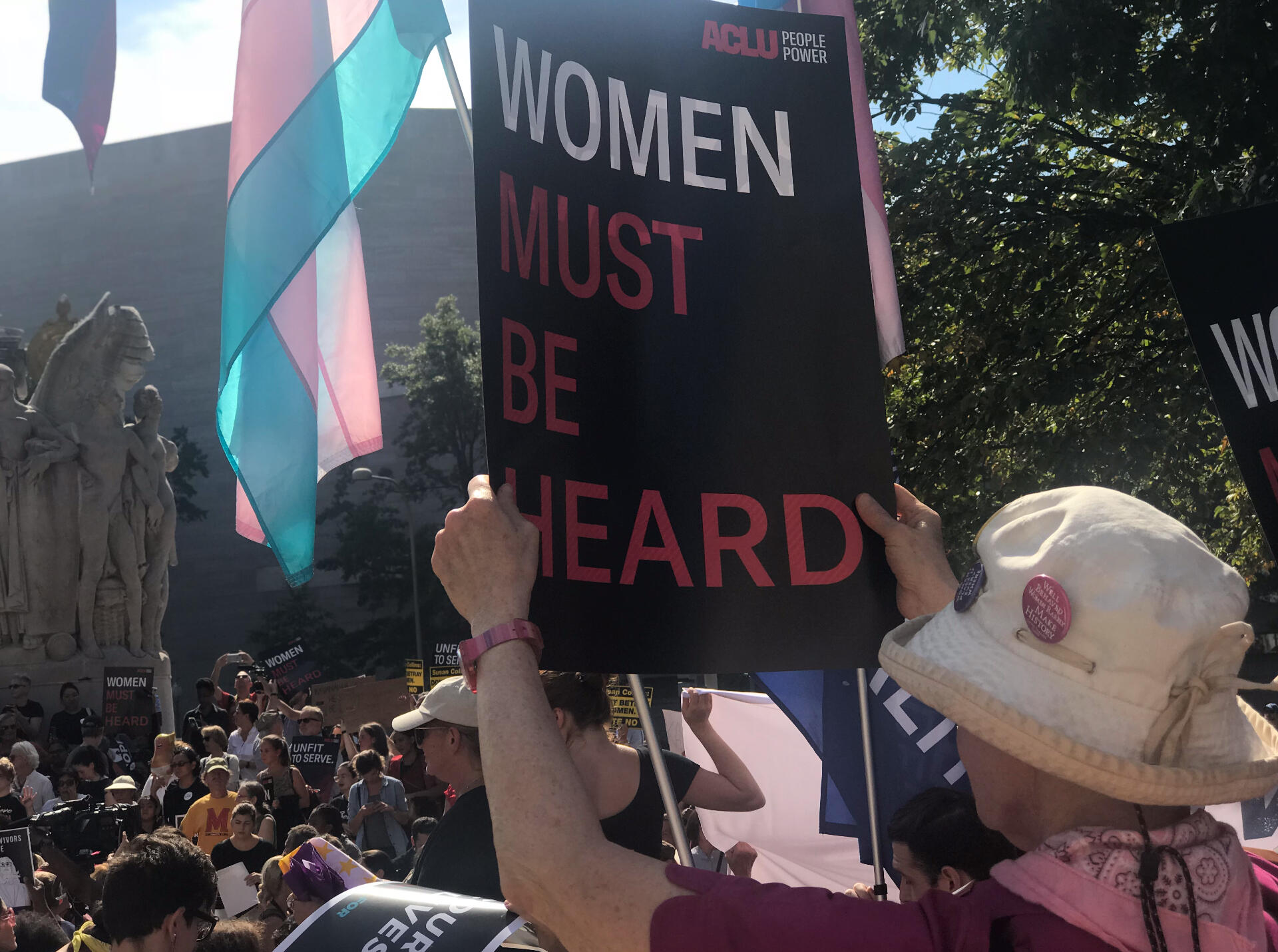
Looking ahead
The question of the presidential race in 2020 and the woman's role
Back in her home state, Sullivan presented her actions on Kavanaugh and for former Democratic Senate challenger Beto O’Rourke in Dallas to a packed living room full of members of the Needham Progressive organization. Days later, she stood outside of the last debate between Sen. Elizabeth Warren and challenger Rep. Geoff Diehl (R-Whitman), sporting signs in support of Warren. She found herself in the middle of a packed victory party for Sen. Warren at the Fairmount Copley Plaza, standing side-by-side with the President of Needham Progressive, John Kirk and his wife and fellow activist Susan, who each did heavy campaigning for Gonzalez. The Kirks said they use Sullivan has a prime example of activism.
"If Candice can hop on a bus in the middle of the night to protest in D.C. or get onto a plane to canvas in Dallas, the members of Needham Progressives can canvas in our neighborhood," said John Kirk as he collected volunteers to knock on doors for Gonzalez the weekend before Election Day. "She's a fighter."
Just a day after the midterms, Sullivan confronted Gov. Charlie Baker’s office to ask if he stood for the Robert Mueller investigation after Trump fired Attorney General Jeff Sessions. Sullivan made her way to nearly every political event heading up to and after the midterms, pinning her shirt with liberal sayings and grassroots campaigns. As the question of the 2020 presidential election looms over the country, Sullivan has a suitcase ready for her next endeavor: the National Annual Women's March in Washington in January.
She said "is done" being quiet and said it's time for more white women her age to join her.
Erin Whitney, 58
Dallas, Texas
Many protestors wear bands that represent their training in civil disobedience. Organizations such as the Women's March, CBD, the Poor People's Campaign, Housing Works, among others, have held divil disobedience Trainings before they conduct a demonstration. Some of the protests that have raided the Capital City since the Trump administration have caused hundreds of arrests for civil disobedience, including the Kavanaugh protests. Trump called these protestors an "angry paid mob" in a series of Tweets at the time. Protestors used the phrase in social media posts and chants as a come-back to the president as they said they were "peaceful" and emphasized on the fact that their protesting was on a volunteer basis.
Erin Whitney was never arrested before the Kavanaugh hearings.
And then she made it her goal to be.
civil disobedience
noun
: refusal to obey governmental demands or commands especially as a
nonviolent and usually collective means of forcing concessions from
the government
Source: Merriam-Webster Dictionary
"I want to get arrested."
Erin Whitney, 58, of Houston, Texas was sipping green tea and eating delivery pizza inside her double-bed suite hotel room the night before she was detained.
Inside the room at the Virginian Suites in Arlington, Virginia, held three other activists and they all had one message to send to America that week: to cancel the confirmation of Supreme Court nominee Judge Brett Kavanaugh. They were bussed or flown in by Women’s March, their hotel room was booked and paid for by Women’s March and it was their job to “just show up” and “speak out.”
The women in the quadruple group were strangers, sleeping inside one room together with only two beds. They had CNN streaming on the television and they spoke about their outrage, their concerns and wishes for the country in pajamas.
Of the four, each of them were mothers, and some grandmothers, as they tapped into the political scene later on in their life. Similar to the others, Whitney, who never took a jab at protesting or speaking out in any way, said she had some apprehension as she spoke to her husband over the phone about what the next day of demonstrations would bring.
“I want to get arrested,” the social worker told her husband, who was in their home in Texas. “It’s not like you really get in trouble. It doesn’t go on your record.”
Less than 24 hours after she hung up the phone with her husband, Whitney had marched at Georgetown University, where those from across the country met with women Law students, in the early morning. At noon, she chanted inside the hallway of Sen. Jeff Flake (R-Arizona), who was still a potential swing vote on Kavanaugh at the time.
By 2:00 p.m. she took a civil disobedience class and walked with some of her roommates from the hotel to the Hart Senate Office Building, a notorious meeting spot for organizers and activists where they would then “dog bird.” Dog birding, at this time, would mean that groups of activists would walk to key senator’s offices and voice their concerns and sexual misconduct cases to legislative aides and the senators themselves. She went to Sen. Joe Manchin’s (D-West Virginia) office and listened to his constituents plead to aides to vote against Kavanaugh.
As President Trump tweeted about the “angry, paid mob” hitting the streets of Washington, Whitney walked into Sen. Susan Collins’s (R-Maine) office and said she was practicing her first amendment right.
“The flavor of this movement is to use our right to speak to the democratic process in a way that we are expected to do if we are going to do our civic duty,” said Whitney. “I am happy to be here.”
Sitting on the floor of the packed Senator’s office, she wrote a letter to Collins on why she should vote against the nominee. She was quiet at first, listening intently to the women speaking on their sexual misconduct cases as conservative women argued that there was no proof that Kavanaugh did anything wrong in his younger years.
Capitol Police filed into the hallway as Whitney moved to one side of the hallway. As Sen. Collins’s voice echoed on live feeds throughout the hallway, the office was shut closed. Soon, Collins would announce she would vote to confirm the nominee and Whitney would scream in outrage. She was arrested for protesting after her second warning by police.
With a flight already booked for the annual Women’s March in January, Whitney said she is ready to do it again.
“Protesting is the most fun I’ve ever had in my life,” said Whitney. “And it’s for fighting for everything I’ve ever believed in.”
Harrie Farrow, 58
Eureka Springs, Arkansas
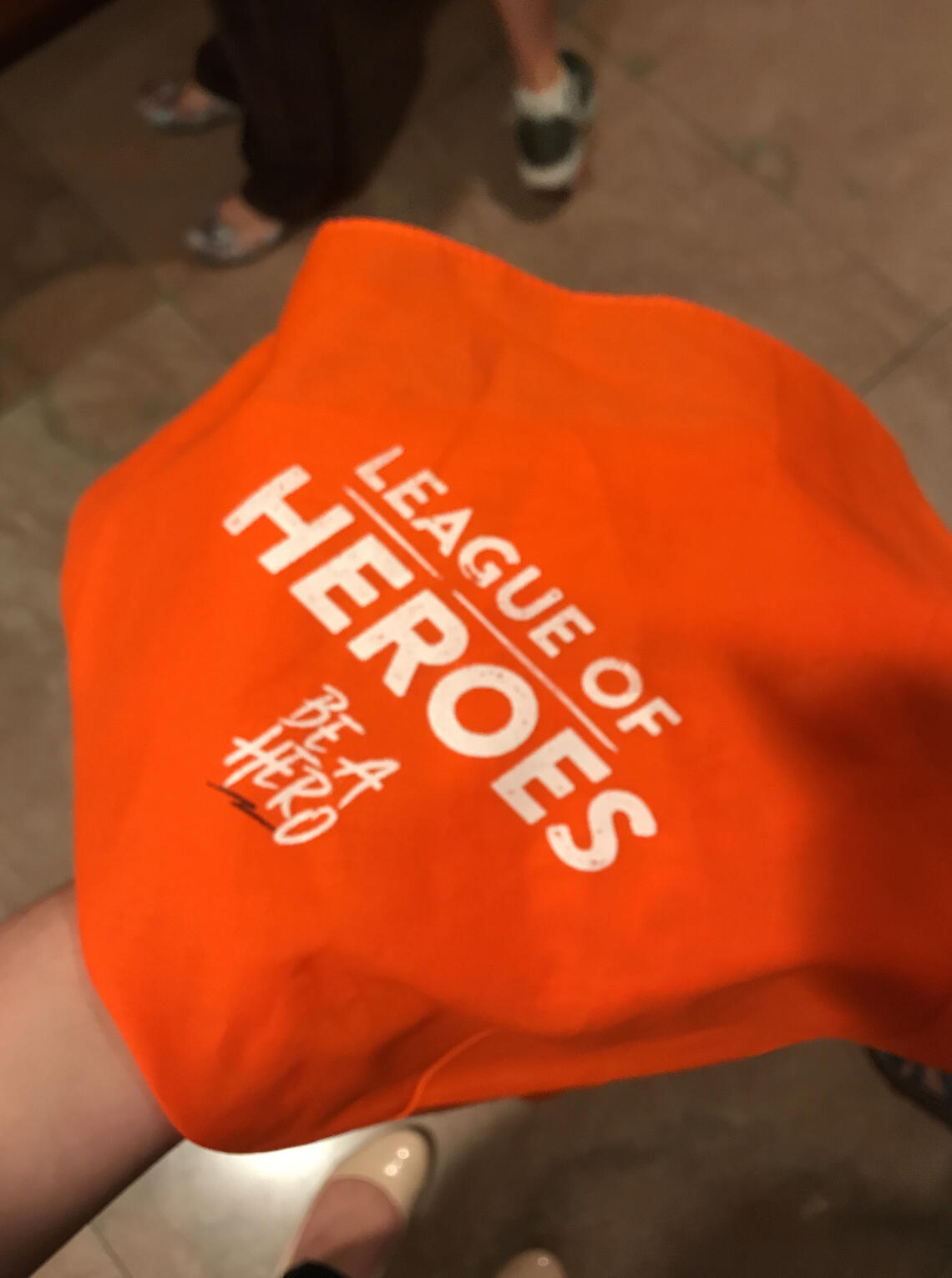
Harrie Farrow, 58, of Eureka Springs is a published author on bisexuality, Communications Director for her local Indivisible chapter, and a former journalist.
She went to Washington D.C. during the Kavanaugh hearings to protest against the nominee to the Supreme Court.
Just hours before the official vote to either confirm or deny Kavanaugh, she told her personal experience of sexual misconduct inside a packed office of Sen. Susan Collins (R-Maine). Women sporting #CancelKavanaugh shirts and #ConfirmKavanaugh buttons were surrounding her.
Sen. Collins was not present in the office during Farrow's speech. However, her legislative aides were.
Sen. Collins voted to confirm Kavanaugh.
Kay Alford Hughes, 75 and Loretta Fudoli, 58
Hot Springs, Arkansas and Conway, Arkansas
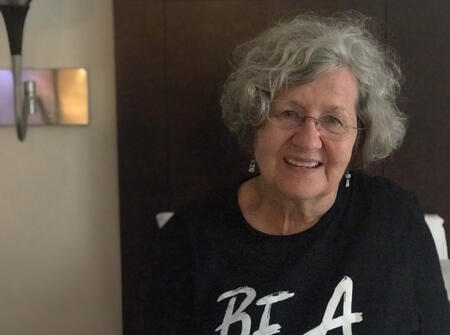
Kay Alford Hughes said she has always voted, but never took action before. Then, Trump was elected.
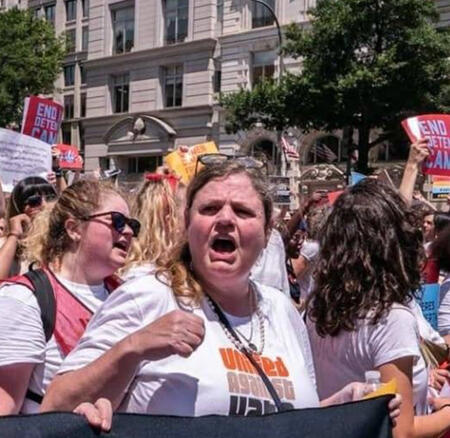
Loretta Fudoli, 58, of Conway, Arkansas tried to stop girls from wearing bras for women's liberation in the sixth grade. Since then, she said she "never" leaned left before 2016. Now, she is going back to her 11-year old self and working with Indivisible chapters, speaking on global warming on panels and in lectures and canvasing for Democratic congressmen and women.
Katherine Alford Hughes, 75, of Hot Springs, Arkansas and Loretta Fudoli, 58, of Conway, Arkansas are both on probation for demonstrating in Little Rock with the Poor People’s Campaign in May of 2018 for blocking an intersection, despite their claims of obtaining permits. They were each given a six-month probation, according to Hughes. Both Hughes and Fudoli attended the #CancelKavanaugh protests in early October, just five months into their probation period.
Fudoli said the last time she protested was in the sixth grade.
“I tried to stop girls from wearing bras for women’s liberation,” said Fudoli, who said she “never” leaned left before 2016. “Now I’ve lost count of how many times I’ve gone to Washington to protest this administration.”
Fudoli went on to aide her local Democratic campaign after she left Washington in D.C.: Jared Henderson for Governor. Henderson lost to the Republican incumbent by 65 percent of the vote, according to The Washington Post.
Hughes said she too never protested before January 2017, when she marched and carried a sign at the Women’s March in Little Rock, Arkansas with her husband.
“Diversity is a code word for white genocide in Arkansas,” said Hughes, a retired school teacher.
Hughes said she would frequently spot neo-Nazi flags on trucks, roads are still named after Jim Crow and there are still “hardly any blacks” in her hometown. She said she would always vote in Presidential and Midterm elections, but during her working years, she did not go into depth on issues.
“I never took action. Then [Trump] made fun of a disabled reporter and there was the video of him talking about grabbing a woman,” said Hughes. “ I knew I had to do something. I said ‘count me in.’”
Hughes said she noticed she is primarily protesting with those also new to the activism scene.
“It’s all the old ladies that are in the lead. We are all retired,” said Hughes, who worked to elect Hayden Shamel, a woman candidate running against Bruce Westerman (R-Arkansas) for the U.S. House of Representatives. “I have been enraged since November 2016 and can’t understand why everyone isn’t.”
Hughes also advised a school newspaper for some time where she would attempt to teach students in the area about the importance of getting “all sides” for a story as well as media literacy. She said it was a difficult task as many of these students would go home and watch nothing but Fox News with their parents, which she identifies as "propaganda."
Both Hughes and Fudoli said that they plan on attending the Women's March in January.
Judi Hershman, 59
Falls Church, Virginia
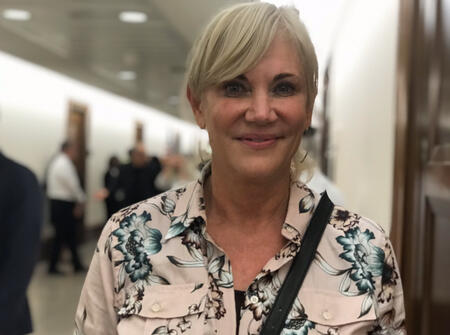
Judi Hershman is a life-long Republican, until now.
Judith Nardella Hershman said she never thought she would protest against a Republican until she watched Supreme Court Justice Nominee Brett Kavanaugh lash out on accusations of sexual assault against him in a Senate hearing.
“I saw that face and I remembered it,” said Hershman, 59, of Falls Church, Virginia.
Hershman stood outside Sen. Susan Collins’s office just hours before the Senator announced in a 45-minute speech that she would vote to confirm Kavanaugh.
Hershman had worked under Merrie Spaeth’s strategic business firm and Special Prosecutor Kenneth Starr to handle his public relations during the Clinton administration. She was featured in Starr’s book “Contempt: A Memoir of the Clinton Investigation” as someone who had been described as a voice of reason. During Hershman’s time under Starr, she said she found herself alone in a conference room, being cornered by Kavanaugh.
“He was being aggressive and bully-ish,” Hershman previously said in an interview. She said she reported the incident to Starr immediately.
Starr said in a statement sent on Monday afternoon that Nardella Hershman provided “valuable” assistance in preparation for the House Judiciary hearings in 1998, but he “does not recall any mention of any incident involving Brett Kavanaugh.”
“Throughout his service in the independent counsel's office, now - Justice Kavanaugh comported himself at all times with high professionalism and respect toward all our colleagues,” wrote Starr in a statement. “I do recall concerns as to the conduct of another lawyer in the office -- not Justice Kavanaugh -- being brought to my attention, and those concerns were promptly addressed and handled appropriately.”
Spaeth, who is has been recently nicknamed a Republican “fixer,” said in an interview that she “would have expected [Hershman] to come and tell” Spaeth directly
In a June 2016 article by KWTX, Spaeth had seemingly directed Starr on how to answer questions to the press regarding a controversial email regarding a sexual misconduct case when he was the president of Baylor University. His response: “I have no recollection of that.” Starr later resigned from his position at the university.
Hershman, a seventh-generation Virginian had been a registered Republican until policies under President Trump’s administration had begun to shift her view. She said she still does not consider herself a Democrat, but this presidency had pushed her to speak out.
Christine Ingles, 65
Detroit, Michigan
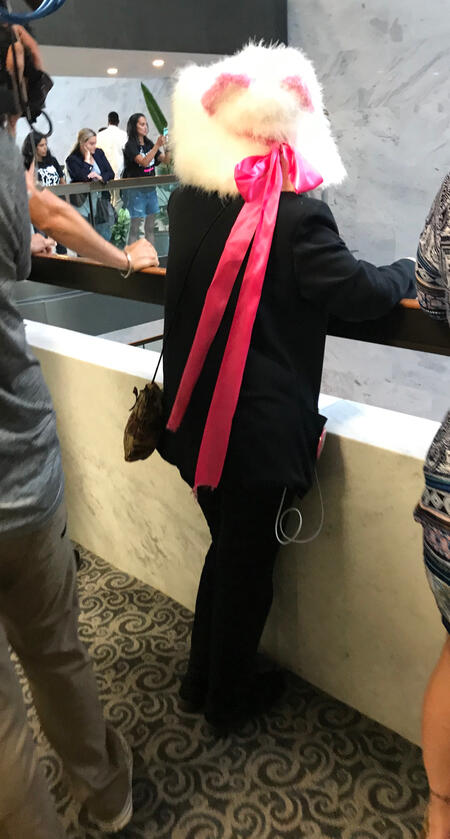
Christine Ingles was arrested 13 times for civil disobedience in Washington D.C. before the Kavanaugh protests in early October.
“Whenever I get lost and don’t know where to go, I just go follow her,” said Valerie Simutis, 45, of Chicago as she pointed to a petite woman in an oversized white, fluffy hat with a pink ribbon that tied in the back and trailed down to the middle of her back. “She’s been arrested 13 times.”
Christine Ingles, 65, of Detroit, Michigan, marched in the back of a storm of protesters, at her own pace, during the #CancelKavanaugh demonstrations as she headed from the Women’s March meeting spot at the Liaison Hotel on Capitol Hill to the Supreme Court. Throughout her walk, people came up to her to give her hugs and say hello. She had handed over items to organizers to wrap in oversized plastic bags with a single piece of duct tape on them with her first and last name written in Sharpie for identification. The items could be later picked up after her potential, future arrest was processed. She only held onto her phone and a portable charger, located in her jacket pocket as she live streamed updates on how Senators were voting on Kavanaugh over the course of the next 24 hours.
“Nothing for me has been the same since Trump was elected into office,” said Ingles, who use to own a cab company and had never protested before June of 2017.
Ingles has been arrested many times since she began her actions against the Trump administration: six times for protesting for the Affordable Care Act, three times for DACA, one time for Family Separation and three times for fighting against then- Supreme Court nominee Brett Kavanaugh
“I was pulled out of the hearings for screaming quite loudly,” said Ingles on her actions during the divisive Kavanaugh Senate hearings. She said her biggest issue with Kavanaugh was before the sexual allegations came out due to his blurry line of the separation between Church and State.
“The Bible is not more important than the Constitution and that’s what he believes,” she said as she joined the outskirts of a formed circle of protesters around chairwomen of Women’s March, Linda Sarsour and Tamika Mallory. Marchers and organizers shouted for senators to vote against Kavanaugh outside of the E. Barrett Prettyman Federal Courthouse on Constitution Ave. Sen. Elizabeth Warren (D-Massachusetts) would later join the activists during the rally.
Ingles had rallied on for the Midterm Elections, where she had then hoped for a Democratic majority to hit the House so that religious Republican elected officials would be challenged to “keep their religion out of politics.”
“Religion has no place in our government or schools,” said Ingles. “That is mentioned twice in our Constitution. I would honestly like to know why there are four members of the Judiciary Committee that are members of the Mormon faith. That is not normal. It’s more of an infestation than logic.”
Senators Mike Crapo (R-Idaho), Jeff Flake (R-Arizona), Orrin Hatch (R-Utah) and Mike Lee (R-Utah) each practice the Mormon faith and were on the Judiciary Committee during the Kavanaugh hearings.
Ingles joked that Capitol Police officers in Washington D.C. recognize her and look to arrest her for civil disobedience, but officers tend to ignore her in her hometown for the same types of demonstrations.
“I do actions in Detroit. I tried to get arrested with the Poor People’s Campaign in Michigan, but they wouldn’t arrest me,” said Ingles.
Candice Sullivan, 45
Dover, Massachusetts
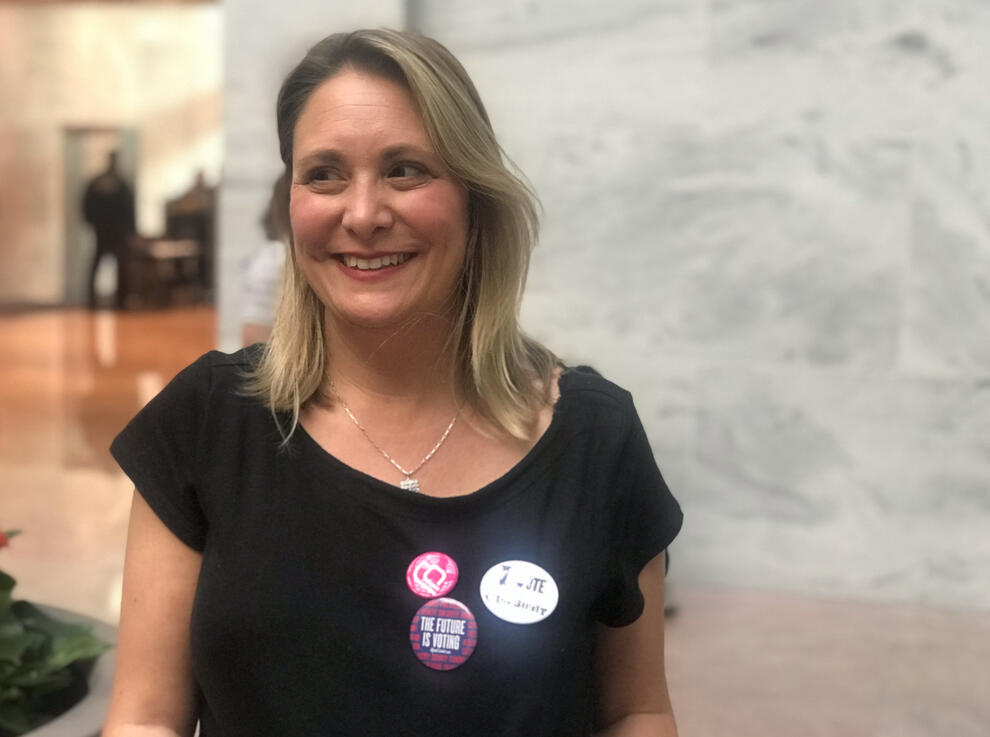
Candice Sullivan has worked on Sen. Elizabeth Warren's campaign, Jay Gonzalez for MA governor campaign, has organized a "March for Our Lives" protest, is an active member of the Needham Progressives Chapter and has travelled across the country to protest against actions done by the Trump presidency.
As the daughter of two Donald Trump supporters, Dover, Massachusetts native Candice Sullivan, 45, finds herself at seemingly every political action venue, event and protest she can.
“I just feel like I have to do something,” said Sullivan, who boarded a bus in the middle of night at Boston’s South Station to head to Washington D.C. to protest against Kavanaugh in early October. “If I do something, internally, it makes me feel like I did something to help.”
The mother of three-- two sons and a daughter-- is a member of the Massachusetts Progressives organization out of the Needham branch; campaigned for Sen. Elizabeth Warren and candidate for Massachusetts Governor Jay Gonzalez, she travelled to Dallas to campaign for Democratic challenger for U.S. Senate, fought in Washington against family separation at the border where she brought her 11-year-old daughter, and has organized her own marches with “Moms Demand Action” to call for gun control and standing up to the National Rifle Association.
Her social media is packed with initiatives and photos of her at political demonstrations across the country. She said her parents, who both live in Georgia, have sent her text messages that said her activism is a “disappointment” and that she will lose her inheritance due to her action against the president.
“They have never been conservative,” said Sullivan of her parents. “They are pro-choice. They have been brainwashed by propaganda like Fox News.”
Sullivan said she will “not stop fighting for what [she] believes in,” no matter the consequences from her family.
Sullivan met 11 other women in Washington, D.C. during the #CancelKavanaugh march and fundraised more than $3,700 to head to Dallas to canvas for Democratic challenger Beto O’Rourke against incumbent Ted Cruz (R-Texas) just days before Election Day.
The group, “Womxn Taking Action for Democracy,” said they were committed to knocking on a total of 1,800 doors each day during their time in Texas.
“We are taking actions for Democracy because we believe in democracy which is guaranteed by the Constitution,” wrote Valerie Simutis, 45, of Chicago, who was also part of the group. “The future will not and cannot be written without us. We are democracy.”
O’Rourke lost to Cruz in an impressively close race in the deep-red state by a mere 2.6 percent, according to the Associated Press.
Sullivan’s activism against Kavanaugh, though, was not just fueled by her dislike of the Trump administration, but by her own misconduct story.
“I thought [Dr. Christine Blasey Ford] was very credible. It made me think of my own experience with sexual assault,” said Sullivan. “Listening to her brought back my own experience. It was very emotional.”
© By Alexa Gagosz. All rights reserved.
2018
Keep Digging
Read more on Alexa Gagosz's website.
Text
